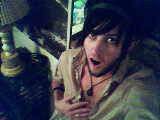elizabeth barrett browning brief bio
-EBB was born in 1806 and died in 1861. when wordsworth died, EBB was considered for poet laureate (a revolutionary consideration for women writers). her father was an enormous personality who dwarfed his children and enveloped all of them and did not want them to marry. EBB (like most other women) became unknowingly addicted to morphine as an invalid child. in 1845 EBB met robert browning via letters and soon eloped against her father's wishes. they loved each other until she died and to robert, she met some of what is considered to be the best love poetry of all time (ex: "how do i love thee? let me count the ways..."). they had one child and she died happy.
book I
-the 1st book in browning's long poem discusses aurora's (browning's semi-autobiographical alter ego) childhood growing up in florence, italy w/ her father. her mother, a tuscan (italian), had died when she was only 4, and aurora's english father was forced to raise her on his own w/o the supplement of her mother's additional, nurturing love. aurora meditates greatly on the life and death of her mother, of what she wished for her childhood vs. her reality and of her mother's presence in death (thru her father, thru portraits of her, thru her aunt, etc.) during aurora's early upbringing.
-aurora's father is an english man w/ property and money, who seems to be too old to marry. the lady of the house (in england) is his younger sister, so if he never married, his sister (aurora's aunt) would become lady of the house. while on vacation in florence, aurora's dad witnesses a catholic parade one afternoon and falls in love w/ a tuscan woman walking in the streets (aurora's future mom). they marry and give birth to aurora. her aunt resents aurora for this and sees aurora's mother's face in hers.
-this late marriage makes aurora's father become uncommon and a free spirit (although this is shortlived). forgetting his estate in england, he becomes more interested in love and the arts (to his sister's dismay and annoyance). this brief period of lifestyle difference and happiness ends when his bride dies and he becomes a man suffering from overbearing melancholy and a sense of loss. a broken man, he struggles to raise aurora on his own and does his best, in her opinion
-aurora leigh is up there w/ other epic poems such as milton's paradise lost. it is also a "bildungsromans" (a novel concerned w/ the edu, development and maturation of a young protagonist).
-EBB did not believe that humans are born as tabula rasas. instead she thinks that we are born as some form of parchment of papyrus that has previously been written on and continues to be written on while we grow. it shapes us. in book I, aurora ponders what has shaped her in her young life so far (like how tv and books have shaped us).
-in the beginning of book I, EBB explains the purpose for writing it. she is now writing for her own use to look upon it later to hold together what she was and is. the murmur of the outer infinite is what you hear if you disregard what culture is telling you (like listening to eternity). thus, the murmur from travels inland = experiencing what culture and life and youth have to offer. aurora explains that her mother died out of a sense of joy and bliss at giving birth (another example of an adoring mother):
"...if her kiss
had left a longer weight upon my lips
it might have steadied the uneasy breath,
and reconciled and fraternised my soul
with the new order..." (pg. 6)
—> in this portion of book I, aurora tells how her childhood was spent looking for a maternal love that her father could not offer her, as mother's love foolishly and father's love wisely, as EBB puts it. mothers understand all the little nuances that babies / their children have and they kiss "full sense into empty words" (pg. 6). they get it. dads can only do so much (it is thought).
"...if her kiss
had left a longer weight upon my lips
it might have steadied the uneasy breath,
and reconciled and fraternised my soul
with the new order..." (pg. 6)
—> in this portion of book I, aurora tells how her childhood was spent looking for a maternal love that her father could not offer her, as mother's love foolishly and father's love wisely, as EBB puts it. mothers understand all the little nuances that babies / their children have and they kiss "full sense into empty words" (pg. 6). they get it. dads can only do so much (it is thought).

No comments:
Post a Comment